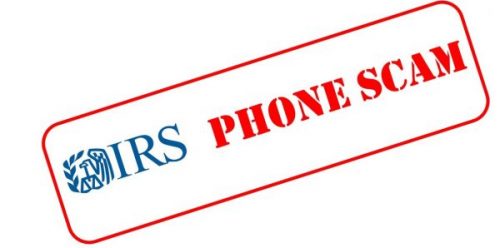Those pesky fake IRS scammers are still at it! You’d think as long as this scam has been going, people would be on to the bad guys by now and not fall prey to them. Not so. If the criminals weren’t successful in forcing their victims to cough up personal information and or money, this imposter scam would be dead in the water. As your managed IT services provider, we want you to be aware so as not to fall victim to these criminals.
If you’ve never had the misfortune of getting a call from an “officer” of the IRS, this is how it works: It starts with an automated message warning the target that he is under a federal investigation and must call to avoid getting into further trouble with the agency. From there, the scammers use voice phishing, or vishing for short, to try to pry personal information, money or both from their would-be victims.
 Who would fall for this, right? The criminals are very convincing and have been known to put the fear of God in their victims making them fork over personal information and even thousands of dollars. A poor fellow in Illinois handed over $20,000 to the crooks out of pure fear and a North Carolina pastor was duped for $16,000. And then there are people who just naively give the bad guys all the information they want. Don’t be that person.
Who would fall for this, right? The criminals are very convincing and have been known to put the fear of God in their victims making them fork over personal information and even thousands of dollars. A poor fellow in Illinois handed over $20,000 to the crooks out of pure fear and a North Carolina pastor was duped for $16,000. And then there are people who just naively give the bad guys all the information they want. Don’t be that person.
What to do if you find yourself on the receiving end of one of these bully’s phone calls? Hang up. That’s it. Just hang up. Unfortunately manually blocking the number probably won’t keep the thieves at bay because they usually use the practice of “spoofing” phone numbers – hiding the true caller ID with a fake number. There are a number of “robo call” blocking apps and tools for both landlines and smartphones that are free or reasonably priced and have good reviews. If you find your phone ringing more than you’d like with telemarketers and scammer, we suggest doing some research to find one that suits your needs.
The best thing you can do to protect yourself is stay informed of current scams and remember the following:
- The IRS will never attempt to call you without first trying to reach you several times by snail mail.
- The IRS will never call or email you to verify your identity by asking for personal and financial information.
- They will not demand that you pay taxes without giving you the opportunity to question or appeal the amount they say you owe.
- The IRS will never require you to pay your taxes with a prepaid debit card.
- They will never ask for credit or debit card numbers by phone or email.
- The IRS will not threaten to bring in local police or other law enforcement agencies to have you arrested.
Another twist to this IRS scam is to call a potential victim – not to threaten – but to verify tax return information in hopes of gleaning personal information such as a Social Security number or personal financial information like your bank or credit card numbers. Again, the IRS will never call you and ask you to verify information over the phone.
Don’t engage with the caller. Just. Hang. Up. With tax season around the corner be mindful of these aggressive tactics used by the criminals. As long as people continue to fall for this scam, the fraudsters will keep at it. Don’t become the next victim.

